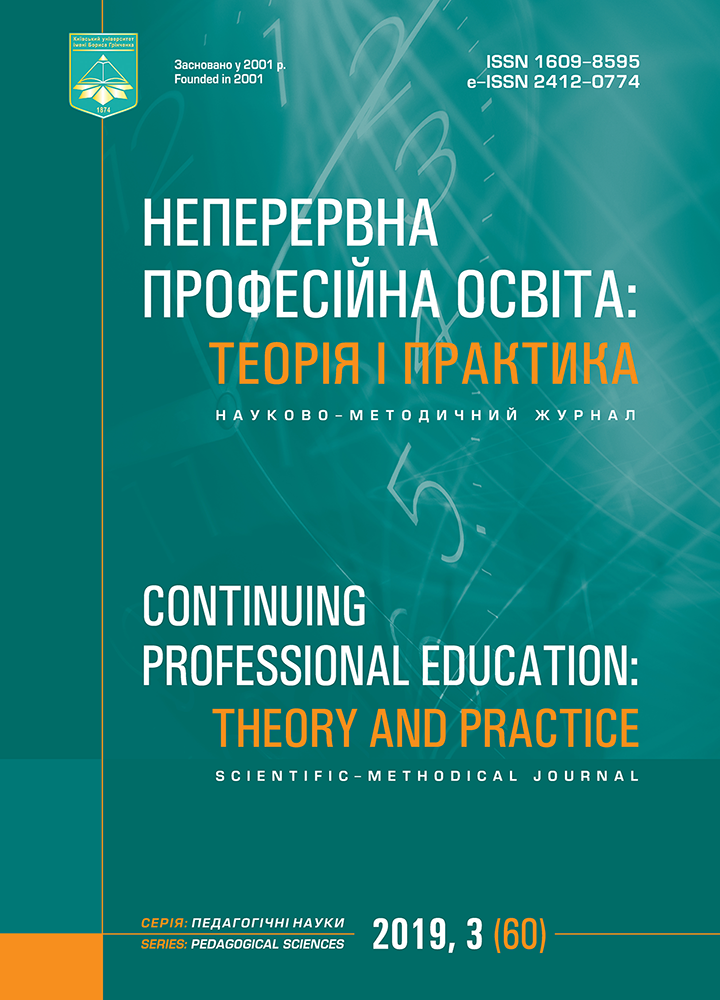PARADIGMS OF ADULT EDUCATION IN THE USA AND CANADA
DOI:
https://doi.org/10.28925/1609-8595.2019.3.7175Keywords:
adult education, Canada, liberalism, progressivism, radicalism, reconstructivism, pragmatism, USA.Abstract
The article deals with methodological basis of adult education development in the USA and Canada. Philosophical directions that influenced adult education development in the USA and Canada are systematized. Essence of liberalism is discovered. According to liberalism a person is a source of society development, that is why his rights and freedom should be supported, equal access to education should be provided to all citizens despite their social status and level of income. Key principals of liberal education are development of personality, upbringing of citizens who can make positive social changes.
Taking into account this fact, informal adult education should be continuous and oriented at development of intellectual abilities of a person, be accessible to all strata of society and its content should coincide with necessities of people.
Key features of progressivism are pointed out. Historical roots of progressivism are connected with progressive political movement in society and education. It was formed due to conception of society and education interaction, empiric theory of education, democratization of education. According to progressivism the main assignment of adult education is fulfillment of educational needs of personality. Modern way of progressive education development is its transformation in conception of social reconstruction, civil education and education for survival, which unite ideas that are lent from pedagogical, philosophical, anthropological, psychological and sociological theories. According to conception of social constructivism informal adult education may become the mechanism that enables certain reconstructions of society.
The main aim of conception for survival is training for survival in conditions of war and conflicts. Ways of its fulfillment in informal adult education are establishment of certain educational programs concerning suicide, alcoholism, drug addiction and inclusion of adults in life of society. Conception of civil education or education in community is oriented at positive social changes and solution of society problems, formation of civil democratic society.
Interconnection between progressivism and social constructivism is viewed. According to philosophy of constructivism a person is unique according to his vision, for this reason he constructs his unique understanding of environment. In this way a person is viewed in informal adult education, when conditions for fulfillment of needs are created, solutions of problems are found; ways of creative thinking are established. Teacher is not a transmitter of ready knowledge; he is a consultant, moderator, and facilitator.
Comparative analysis of behaviorism and humanistic direction is conducted. Characteristic features of radicalism are investigated. Key features of a person who self-actualizes are adequate perception of reality which should be perceived calmly, understanding of oneself, other people and environment, understanding of problems, independence of others, constant desire for self-evaluation, search for interpersonal relations, respect, ethic qualities, sense of humor, creative character, desire for self-actualization, open to new experience. Key assignment of teachers is to find and open potential of a person. It was found out that progressivism, behaviorism and social constructivism are key philosophical directions that influence adult education development in the USA and Canada. According to behaviorism personality is a complex of reactions to outer impulses. For this reason, the aim of adult education is modification of adults’ behavior taking into account changes in personality.
References
Bidyuk, N. (2009). Teoriya I praktyka profesiynogo navchannya bezrobitnyh v SHA [Theory and Practice of Professinal Education of Unemployed in the USA]. Hmelnickij, Ukraine: HmCNTEU (ukr).
Komenskyi, Ya. А. (1989). Velikaya didaktika [Great Didactics]. Moscow, Russia: Pedagogica (rus).
Kumbs, F. (1970). Krisis obrzovniy v sovremennom mire. Sistemnyi analis [Crisis of Education in Modern Society: System Analysis]. Moscow, Russia: Progress (rus).
Ogienko, O. (2009). Tendenciyi rozvitku osviti doroslyh u Skaninavskyh krinah (druga polovina XX stolittya) [Tendencies of Adult Education Development in Scandinavian Countries (Second Half of the XX Century)]. Sumy, Ukraine: Ellada (ukr).
Freire, P. (2003). Pedagogika Prygnoblenyh [Pedagogics of the Opressed]. Kyiv, Ukraine: Universe (ukr).
Bergevіn, P. A. (1967). Phіlosophy for Adult Eduсatіon. New York, USA: Seabury (eng).
Elіas, J. L. (2004). Phіlosophіcal Foundatіons of Adult Educatіon. New York, USA: Krіeger Pub Co (eng).
Freіre, P. (1997). A Pedagogy for Lіberatіon: Dіalogues on Transformіng Education. South Hadley, USA: Bergіn & Garvey Publіshers (eng).
Jarvіs, P. (2012). Adult Learnіng іn the Socіal Context. London, UK: Routledge (eng).
Knowles, M. S. (1950). Іnformal Adult Educatіon: A Guіde for Admіnіstrators, Leaders and Teachers. New York, USA: Assocіatіon Press (eng).
Lіndeman, E. (2009). The Meanіng of Adult Educatіon. Norman, OK, USA: Unіversіty of Oklahoma Press (eng).
Maslow, A. H. (1990). Motіvatіon and Personalіty. New York, USA: Harper & Row (eng).
Merrіam, S. B. (2013). Adult Learnіng: Lіnkіng Theory and Practіce. San Francіsco, USA: Jossey-Bass (eng).
Rogers, A. (2010). Teaсhіng Adults. Phіladelphіa, USA: Open Unіversіty Press (eng).
Downloads
How to Cite
Issue
Section
License
Copyright (c) 2020 Olena Terenko

This work is licensed under a Creative Commons Attribution-NonCommercial 3.0 Unported License.



